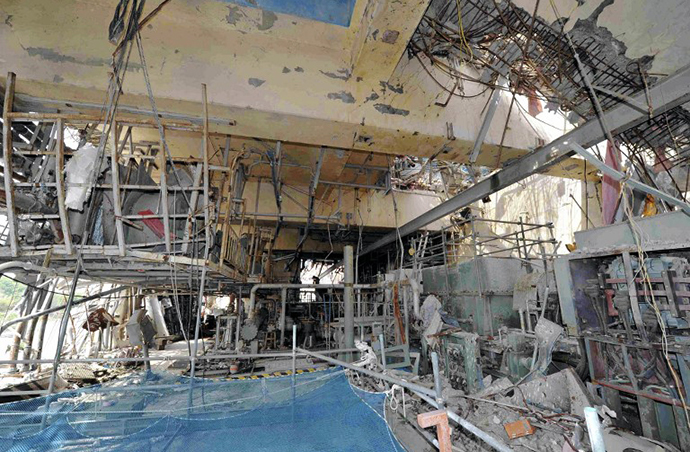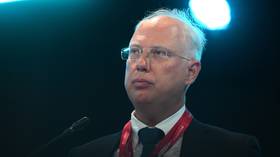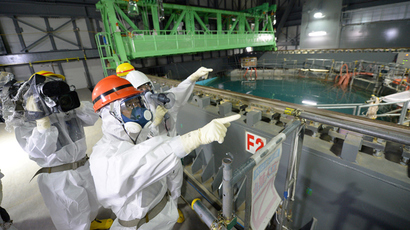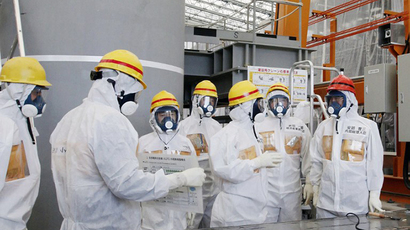Japan govt considers assuming Fukushima decontamination – media

Tokyo is reportedly considering stripping the Fukushima nuclear operator of the responsibility to decontaminate the devastated station and passing it under full government control. That would imply assuming TEPCO’s massive current clean-up expenditures.
The ruling Liberal Democratic party’s committee overseeing the government bailout of TEPCO finalized on Tuesday the proposal to nationalize decontamination works at Fukushima Daiichi nuclear power plant by splitting TEPCO’s activities, Japanese media reports.
The proposed spin-off could leave TEPCO concentrating on maintenance and the operability of its three nuclear power plants, while decontamination and reactor decommission at the Fukushima nuclear power plant would fall under full government control, with the possible creation of an independent administrative governmental agency.
"We need to have a prompt conclusion to create a clear and realistic organization,” said the draft proposal, according to Reuters.
The move means many billions of Japanese taxpayers’ dollars might be channeled to cleaning up the Fukushima facility after two-and-a-half years of TEPCO proved unsuccessful in taking the situation at the disaster-prone facility under control.
“Personally, I don’t feel it’s right to say that all responsibility belongs with TEPCO,” Taro Aso, Japan’s Finance Minister, told reporters.
The Japanese government has been backing the Fukushima operator since 2011, promising massive financial aid - up to 5 trillion yen (roughly $50 billion) - for decontamination and compensation payments to 160,000 evacuated residents that used to live around the Fukushima nuclear power plant.
But what have been lacking in the scheme are positive results in
damage control and recovery, as TEPCO failed to prevent accidents with radioactive waste leakages at
the station.
Since the Japanese government nationalized TEPCO last year with a
taxpayer-funded rescue, there has been constant argument about
how largely the authorities should be involved, both
administratively and financially, in eliminating the consequences
of the Fukushima incident.
Since the disaster on March 11, 2011, Japanese government has
been expecting TEPCO to bring tangible results in clean-up at
Fukushima Daiichi nuclear power plant, but great expectations
proved to be in vain.

In early September, after Japan’s Prime Minister Shinzo Abe claimed the situation at Fukushima is under control, a senior TEPCO official had to contradict PM, saying that the radioactive water leakage at the crippled Fukushima plant continues.
But probably the incident that ended the government’s patience was in late October, when a Fukushima cleanup worker-turned-whistleblower exposed the plant’s chaotic system of subcontractors, their alleged yakuza organized crime connections, and the super-exploitation of indigent workers doing dangerous work.
What has been infuriating the Japanese public and lawmakers alike is the policy of total concealment of the scale of the disaster and disavowal to acknowledge impotence to fight the emergency at the TEPCO Company.
On Monday Niigata Prefecture Governor Hirohiko Izumida accused TEPCO of “institutionalized lying” practices in an interview to Reuters.
Initially, TEPCO promised to finish the clean-up at Fukushima facility in a matter of months. Now it appears that the complete decontamination of the facility will take three decades and cost up to $100 billion, Reuters reports.
TEPCO has already lost $27 billion since the Fukushima disaster occurred and, after all of the Japanese nuclear power facilities were shut down, has lost its sole source of revenue. That is why the company has announced plans to restart its Kashiwazaki Kariwa power plant - the world’s biggest nuclear complex - in Niigata Prefecture next spring, which has already raised concerns among the public and local authorities.
In December it will be 1,000 days since the Fukushima nuclear disaster occurred, becoming the worst since the Chernobyl catastrophe in 1986. But more and more news about new leakage of highly radioactive waste at the facility come on a regular basis, which means Japanese government has huge work ahead to curb the consequences better than TEPCO has been doing.














